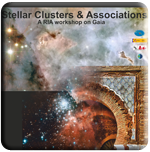SONYC - Substellar Objects in Nearby Young Clusters
Mužić, K.; Scholz, A.; Geers, V. C.; Jayawardhana, R.; Tamura, M.
16th Cambridge Workshop on Cool Stars, Stellar Systems, and the Sun. ASP Conference Series, Vol. 448, proceedings of a conference held August 28- September 2, 2010 at the University of Washington, Seattle, Washington. Edited by Christopher M. Johns-Krull, Matthew K. Browning, and Andrew A. West. San Francisco: Astronomical Society of the Pacific, 2012., p.683
12/2011
ABSTRACT
The origin of the lowest mass free-floating objects - brown dwarfs and planetary-mass objects - is one of the major unsolved problems in star formation. Establishing a census of young substellar objects is a fundamental prerequisite for distinguishing between competing theoretical scenarios. Such a census allows us to probe the initial mass function (IMF), binary statistics, and properties of accretion disks. Our SONYC (Substellar Objects in Nearby Young Clusters) survey relies on extremely deep wide-field optical and near-infrared imaging, with follow-up spectroscopy, in combination with Spitzer photometry to probe the bottom end of the IMF to unprecedented levels. Here we present SONYC results for three different regions: NGC 1333, ρ Ophiuchus and Chamaeleon-I. In NGC 1333, we find evidence for a possible cutoff in the mass function at 10-20 Jupiter masses. In ρ Oph we report a new brown dwarf with a mass close to the deuterium-burning limit.


